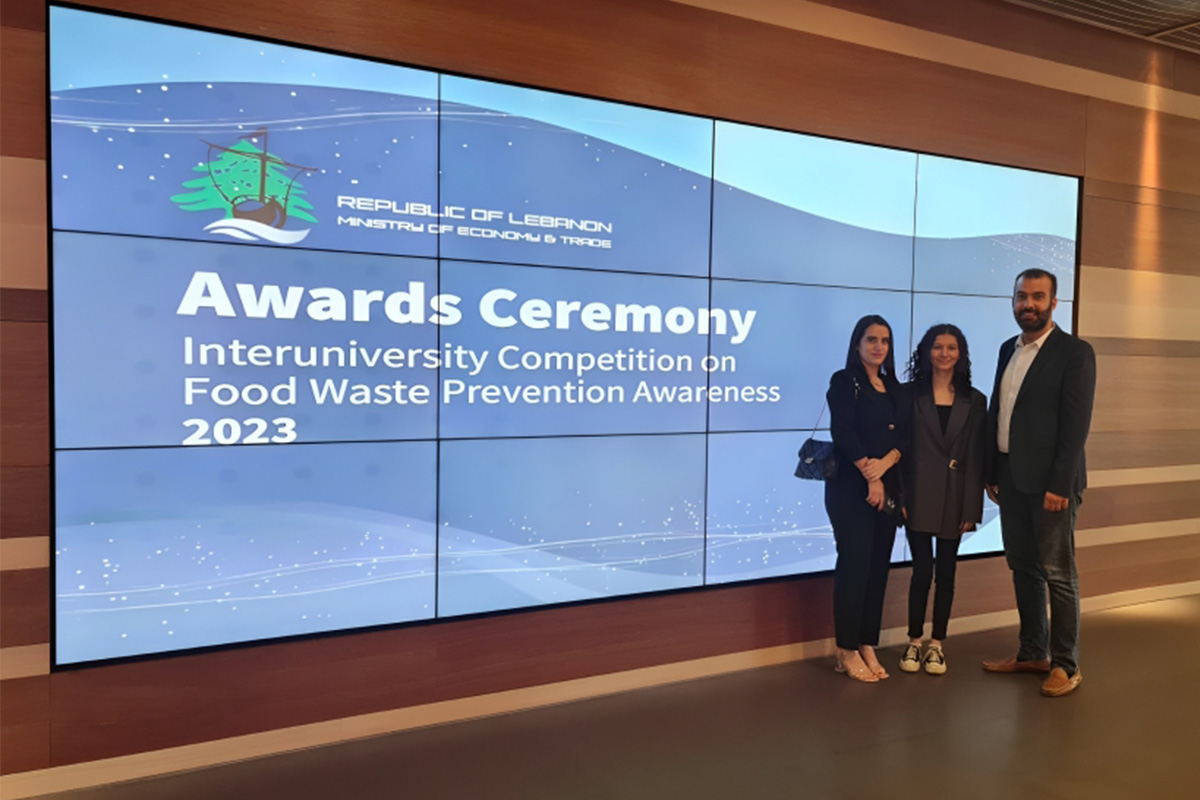LAU Nutrition Students Win National Best Poster Competition on Food Waste Awareness
LAU Nutrition students took the lead in showcasing their dedication and innovative ideas on food waste.
Against the backdrop of a worsening economic crisis and food insecurity, two LAU students, Roa Echtay and Hanin El Hajj, stepped forward to raise awareness about food waste by participating in the Ministry of Economy and Trade’s Interuniversity Competition on Food Waste Prevention Awareness 2023. At the end of it, they brought home an award for their winning poster which will be displayed on billboards across the country.
A total of 11 posters and videos from nine universities were submitted to the competition, which invited students to create a concise awareness design or video on this global concern with a focus on Lebanon.
In their active participation and success, Echtay and El Hajj represent the socially responsible individuals that the Nutrition and Dietetics Program at the Department of Natural Sciences seeks to nurture by equipping them with the necessary skills and dedication to positively impact patients and the community.
As third-year nutrition students, they have cultivated a deep understanding of the complex and intricate connections between food insecurity, safety and waste throughout their time at LAU. Along with active engagements in competitions and internships related to this issue, they have gained “practical insights on the prevalence of food waste in Lebanon,” they said, adding that “against the background of an exponentially dire problem, we were motivated to shed light on this topic in hopes of lessening it.”
The award also reflects LAU’s commitment to the UN Sustainable Development Goals (SDGs) by addressing critical societal issues in collaborative efforts within its community.
Building on the students’ theoretical understanding of food insecurity, safety and waste, as well as the complex interplay between them, Associate Professor of Food Science and Technology Hussein F. Hassan guided and supervised them throughout the project. Together, they explored the literature on food waste conducted in Lebanon and at LAU and managed to identify the effectiveness of triggering guilt to reduce food waste.
Through their research and readings, Echtay and El Hajj learned that a significant portion of food waste is generated by restaurants – Mediterranean ones in particular – due to the Lebanese culture of sharing an overfilled table as a symbol of generosity and hospitality. “This is evident of the larger underlying problem: There is an inequitable distribution of resources, leading to waste amongst those who can afford it and hunger amongst those who cannot,” they noted.
The duo managed to creatively capture the extent of food waste in the country in a poster illustrating one-third of a falafel dish, and highlight the need to address SDG12 Responsible Consumption and Production which, as Dr. Hassan explains, “specifically aims to halve global food waste by 2030.”
The poster also underscored the prevalence of hunger in Lebanon and urged viewers to “think about it,” in line with evoking a sense of guilt and responsibility in reducing food waste, he added.
“We hope that our poster will motivate change,” said Echtay and El Hajj. “The fact that food is wasted at a time of widespread poverty is indicative of a fundamental structural problem in the way resources are distributed in our country. We hope that our poster makes people aware of the inequity and motivates change to create a positive social impact.”
Following this success, LAU aims to include partnerships with hospitality services and organizations in its continuing efforts to combat food waste and promote awareness through events and educational campaigns, integrating food waste concepts into the curriculum and supporting research projects and initiatives related to food waste reduction.
